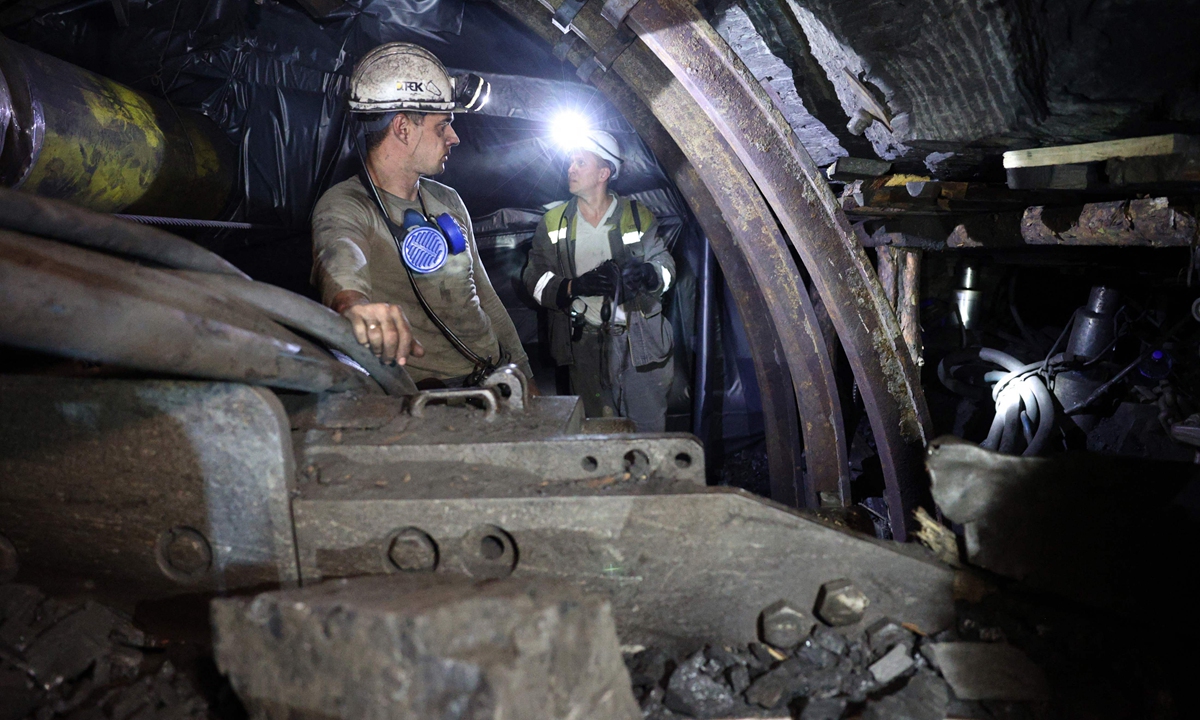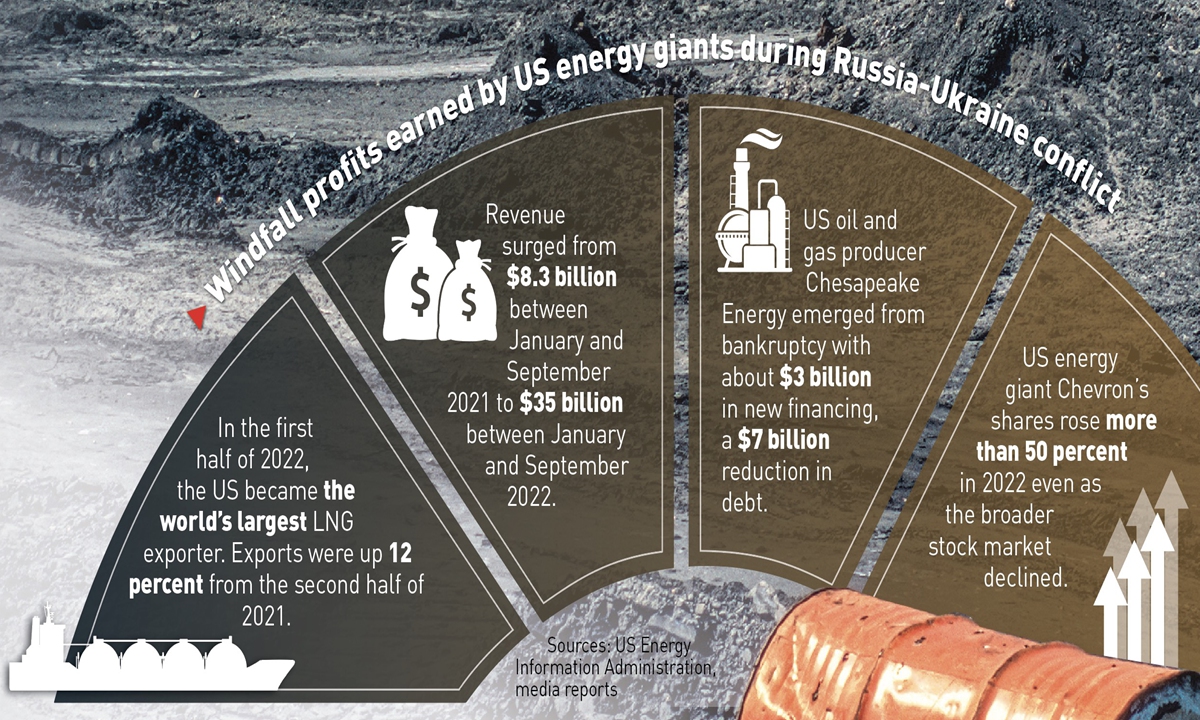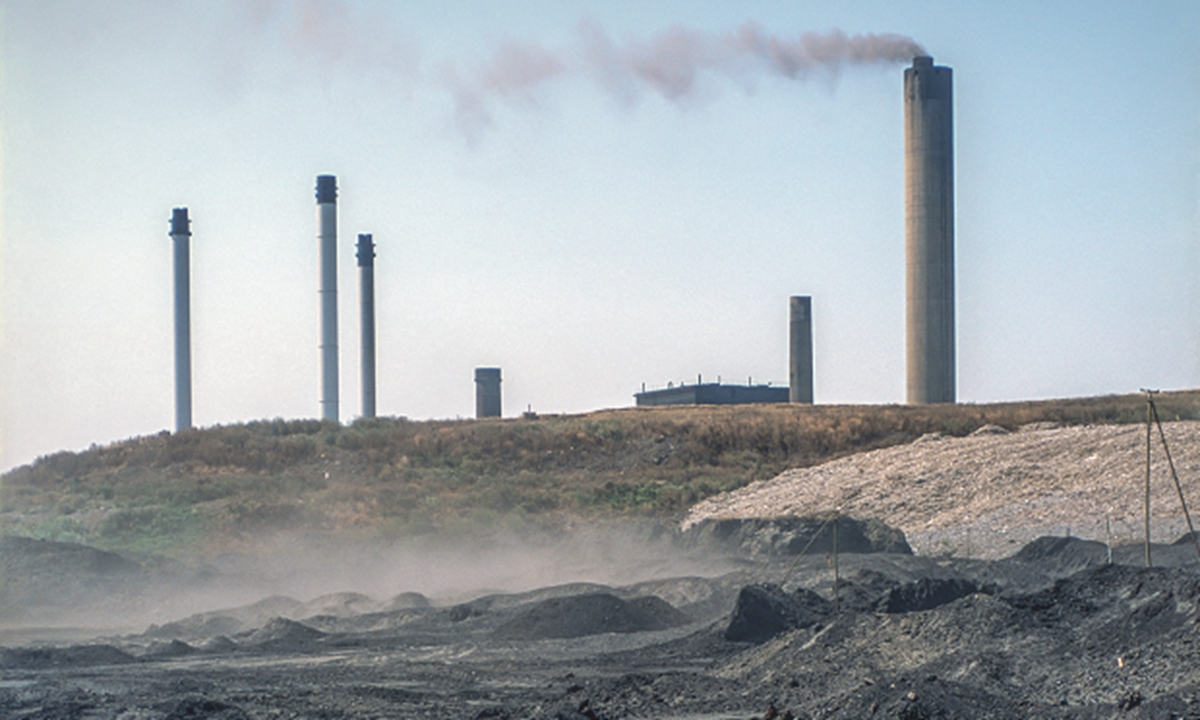
Miners work in a tunnel at a coal mine in the Dnipro region in Ukraine, on June 9, 2023. Photo: VCG
Energy giants from the US are extending their claws from old battlefields in Iraq and Syria to new targets in Ukraine, increasing their investments in Ukraine's oil, gas, and nuclear infrastructure under the guise of helping Ukraine get rid of its dependence on "dirty energy" imports from Russia.
Faced with dangerous and opaque new orders, some Ukrainians are worried that large energy equipment invested in by the US will bring with it more risks and setbacks to their country.
Chinese experts pointed out that the US, in the name of helping Ukraine, and Europe as a whole, to fully transition from Russian energy, is actually serving to fatten the wallets of American energy giants and safeguarding its own political interests.
In true hypocritical US fashion, many of the country's promises have been nothing but "empty talk," exposing the country's nature of making war money, they warned.
Rush order amid conflicts

Graphic:GT
While the US keeps adding fuel to the fire of the ongoing Russia-Ukraine conflict, its power and energy giants are busy expanding business in the country, trying to take a large share of nuclear and oil projects for themselves.
Ukraine's state nuclear company Energoatom signed agreements with the US-based Westinghouse Electric Company in June 2022 to increase the number of planned new AP1000 reactors for Ukraine from five to nine, and "supply fuel to all of its atomic power stations," according to Energoatom.
Energoatom announced that it would stop using Russian nuclear fuel. "It was already in the process of diversifying its fuel supplies, but will now be making a full shift to using Westinghouse fuel," World Nuclear News reported in June 2022.
This project and its potential risks sparked worry among many Ukrainian citizens.
In April, one of Ukraine's largest environmental organizations Екодiя, or "Eco-action," initiated a petition to the Cabinet of Ministers against the proposed construction of new nuclear power plants.
"Ukrainian nuclear power plants are being converted to American fuel to get rid of dependence on Russia," Екодiя wrote in its April petition. "However, plans to build new blocks even with Westinghouse threaten the security of Ukrainians, the economy, and the environment," it noted.
In an email sent in reply to the Global Times, Olexii Pasiuk, an energy policy expert at Екодiя, wrote that Екодiя initiated the petition to make the country's authority aware of public discontent over the plans. "It is of common interest to make Ukraine a safer place."
Any new nuclear power plant will increase Ukrainian dependence on [foreign energy companies], said Pasiuk.
Worse still, the possible nuclear pollution caused by the power plants could be a big threat to residents. "Ukraine is the site of the Chornobyl nuclear accident which caused an enormous impact on society," he added.
Ukraine's current tension with Russia makes people there worry that some large investment projects, including the nuclear projects, may become targets of attack in wars. Apart from the danger of deliberate nuclear incidents, "there are [also] plenty of various scenarios that would cause major accidents, even without military attacks," Pasiuk said.
The title of Екодiя's petition against this project is "Save Ukraine from a New Threat." "There are viable alternatives of renewable energy that can produce electricity cheaper and faster," Pasiuk noted.
Nonetheless, the safety of the project is widely questioned by many environmental organizations and individuals.
The safety of the design of the planned reactors has even caused concern at the US Nuclear Regulatory Commission, said Екодiя. "For example, their protective envelope has not demonstrated the ability to withstand extreme weather conditions," it wrote in the petition.
More US enterprises are reaching their Ukrainian peers for cooperation in nuclear project construction. In April, Energoatom and US-based Holtec International are reportedly to have signed an agreement for the potential deployment of up to 20 small modular reactors.
The two companies will jointly carry out the work for licensing and deployment of SMR-160 reactor technology throughout Ukraine, reported NucNet, independent news agency and information network for the global nuclear industry.
"Ukraine's dependence on American energy will greatly increase its costs, which is a short-sighted approach," Shen Yi, a professor at the School of International Relations and Public Affairs at Fudan University, told the Global Times. "The US is using this conflict to disrupt the local energy market, largely to expand its energy exports."
Shen said that the US has always had a huge demand for energy exports in its history. After the shale oil revolution, the US became an energy-exporting country, and it urgently needs to find more markets in the international community.
However, the current turbulent situation is not conducive for the US to develop energy locally, and the rush to sign orders may only be a hollow promise, the expert said.
Further safety concernsIn addition to setting the stage for future environmental pollution in Ukraine and around the world, America's fossil fuel and nuclear power gold rush in Ukraine raises an even bigger security issue - potential risks of creating more strike targets amid an ongoing conflict.
Ukraine state gas producer Naftogaz held talks in April with big US oil groups including ExxonMobil, Halliburton, and Chevron about Ukraine energy projects in a bid to increase output in the country, to achieve the target of increasing natural gas production to 13.5 billion cubic meters this year, the Financial Times reported in April.
"Under the guise of 'liberating' Ukraine from a reliance on Russia's dirty energy imports, there has been an explosion of investment in oil and gas infrastructure which, once it's built, will be around for a long time," Michael Shank, an adjunct professor at the New York University's Center for Global Affairs, said in an opinion piece published on Newsweek on May 14.
"Concerns loom large regarding new nuclear power plants being targeted for nuclear terrorism," Shank said. "All these American approaches to 'saving Ukraine' and 'liberating' them from Russian reliance reinforce a centralized energy system. And that's exactly what Ukraine doesn't need. Ukraine needs to decentralize its energy system, not centralize it."
Big nuclear plants and big coal, gas, and oil facilities just give enemies bigger targets to bomb, sabotage, or hack, Shank argued.
The recent attack on the Kakhovka hydroelectric power plant in Ukraine caused a catastrophic dam breech, which has set back the country's largest water reservoir, releasing a torrent of contaminated water into cities and towns downstream, reported the Xinhua News Agency.
As Russia and Ukraine continue to trade accusations over the attack, the dam collapse continues to inflict humanitarian, environmental, and agricultural costs upon the flooded zone, with a potential impact that is likely to ripple across the world in the years to come.
Unlike China which expressed grave concern and called on both sides to exercise maximum restraint, the US, rather than calling for a ceasefire, is now providing Ukraine with new dangers, experts alerted, pointing out that behind this strategy is economic windfalls.
Take a look at how much the US is making by expanding its energy footprint in the Russia-Ukraine conflicts: In the first half of 2022, the US became the world's largest LNG exporter. Exports were up 12 percent from the second half of 2021; According to data from the US Energy Information Administration, revenue surged from $8.3 billion between January and September 2021 to $35 billion between January and September 2022; US oil and gas producer Chesapeake Energy emerged from bankruptcy with about $3 billion in new financing, a $7 billion reduction in debt, and $1.7 billion cut from gas processing and pipeline costs, Reuters reported; Shares of the above-mentioned US energy giant Chevron rose more than 50 percent in 2022 even as the broader stock market declined, CNBC reported.
Lies behind energy expandingThere is a precedent for the US using the current Ukraine crisis to seize energy markets in Ukraine.
Prior to Westinghouse, fuel supplies were "monopolized" by the Russian nuclear power company TVEL. The rising tensions between Ukraine and Russia in recent years seemed to have offered Western companies like Westinghouse opportunities to enter the Ukrainian market.
In 2014, months after the Crimea incident, Westinghouse signed an agreement with Energoatom to "significantly increase" nuclear fuel deliveries to Ukrainian nuclear power plants until 2020, World Nuclear News reported on December 31 that year.
Soon after, Russia's Foreign Ministry issued a statement stating that it was "alarmed" by news of the contract," according to World Nuclear News.
"Of particular concern is the fact that all this is happening against the backdrop of an unstable situation in Ukraine, in an environment where political engagement takes precedence over the requirements of nuclear safety," said the statement, "[Nuclear safety] is being used for political ambition," it noted.
Ukraine has predominantly and long been reliant on the Soviet Union for energy. Since the Russia-Ukraine conflict broke out, the US has been eager to sell its petrochemical energy and nuclear power plants to Ukraine, both to satisfy exports and to shift the entire Europe away from Russia as an energy source, which is in line with US interests, Song Zhongping, a Chinese military expert and TV commentator, told the Global Times.
"This is also why the US keeps fomenting conflicts. The US looks like it is helping Europe, but the fact is it is destroying Europe," said Song.
For a long time, using energy exports as a diplomatic bargaining chip has been the US Congress and government consensus. With the outbreak of the Russia-Ukraine conflicts, American politicians have spewed various so-called "justice" statements, but behind the scenes, politicians and businessmen are seizing the opportunity to make money from the crisis, observers noted.
Just as Shank concluded, if Americans really want to help the people of Ukraine and their security, which is what they claim to care about, "clean reconstruction is what will set the country on a more stable path: Local jobs, local power plants, local supply, and local control."

A fly ash dump site next to a large manufacturing plant. Photo: VCG






